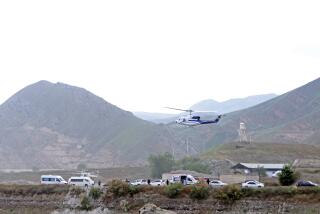Again Florida-Bound, Storm Is Fading : Weather: After a destructive zigzag trail in the Caribbean and Atlantic, forecasters say it could soon be downgraded to a tropical depression.
Tropical Storm Gordon rolled back toward Florida on Saturday, a shadow of its former hurricane self, and will probably die out before it hits the peninsula.
“It’s continuing to weaken,” said Max Mayfield, a meteorologist for the National Hurricane Center in Coral Gables. “It could be downgraded soon to a tropical depression.”
Gordon, born Nov. 8 off the tip of Nicaragua, zigzagged as a tropical storm through the Caribbean, killing more than 500 people in Haiti, before snaking across Florida, where it battered homes and crops.
Gordon next slid into the Atlantic, where it strengthened into a hurricane and brushed the coastal Outer Banks of North Carolina.
Four beach houses were toppled by high surf on the Outer Banks, but three had already been condemned because of damage from previous storms. Part of the highway that links the chain of islands was undercut by erosion.
Beach-goers were out with sail boards Saturday as the storm trailed away to the south. “The wind’s howling. It’s great out there,” said Edward Yerkovich of Buffalo, N.Y., as he hauled his board out of Roanoke Sound.
At 10 p.m. EST, Gordon was about 335 miles east of Daytona Beach.
It was moving south at 8 m.p.h. and a gradual turn toward Florida was expected in the next 24 hours. Forecasters said it should be a depression by today.
Its sustained wind speed had dropped from 70 m.p.h. early Friday to near 40 m.p.h. Once its wind drops below 39 m.p.h., it will be reclassified as a tropical depression.
Strong northwesterly wind weakened its drenching thunderstorms, and its barometric pressure had increased, easing the threat of more rain, meteorologists said.
Gordon may have cost Florida’s agriculture industry $336 million, the state Department of Agriculture said Saturday.
The state grows about half of the nation’s winter vegetables, including squash, sweet corn, tomatoes and potatoes. As a result of Gordon, some producer and retail vegetable prices could rise as much as 20% on the East Coast.
Gordon also damaged homes in Florida.
Gov. Lawton Chiles on Saturday asked President Clinton to designate the counties hardest hit by Gordon as disaster areas. If granted, federal grants or low-interest loans would be available to help people recoup their losses.
Damage estimates are still coming in, so Chiles did not specify which counties he wanted declared disaster areas.
More to Read
Start your day right
Sign up for Essential California for news, features and recommendations from the L.A. Times and beyond in your inbox six days a week.
You may occasionally receive promotional content from the Los Angeles Times.






